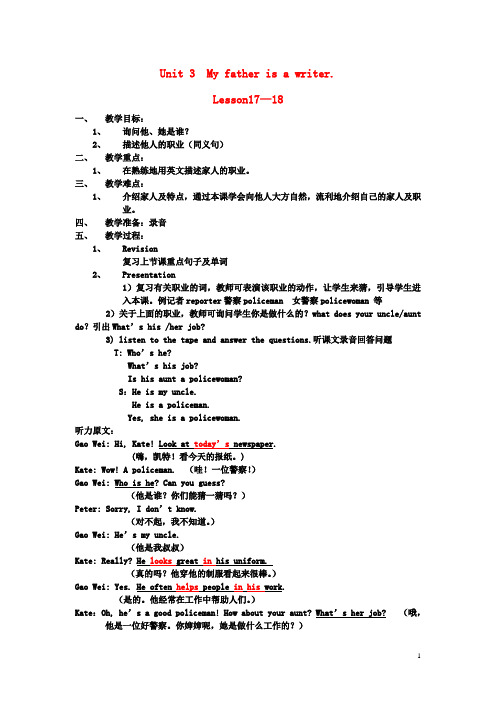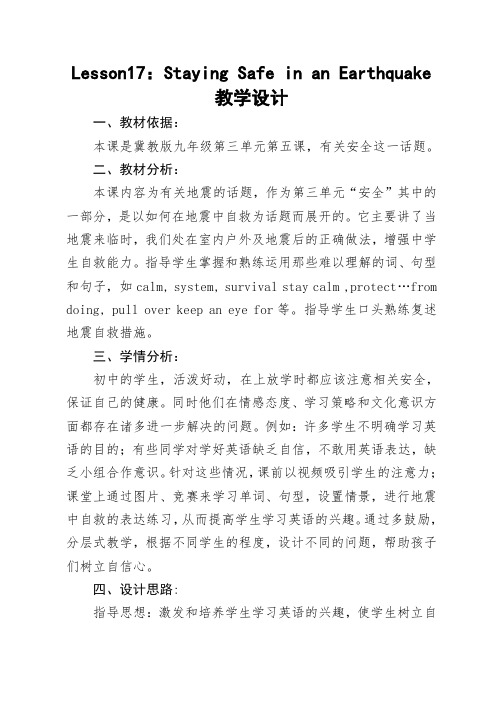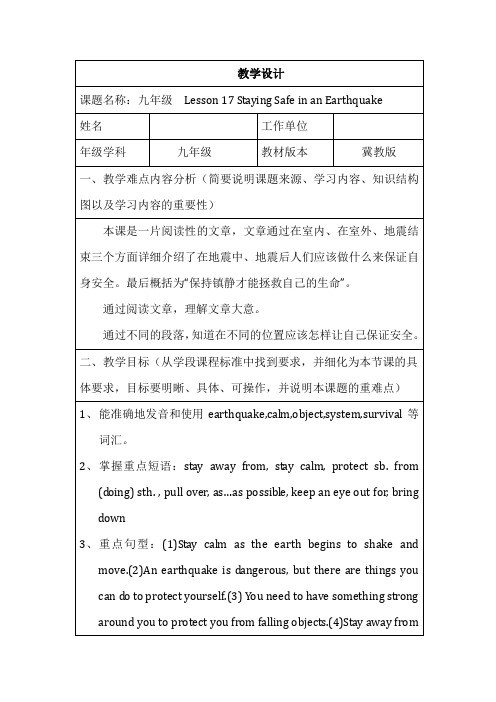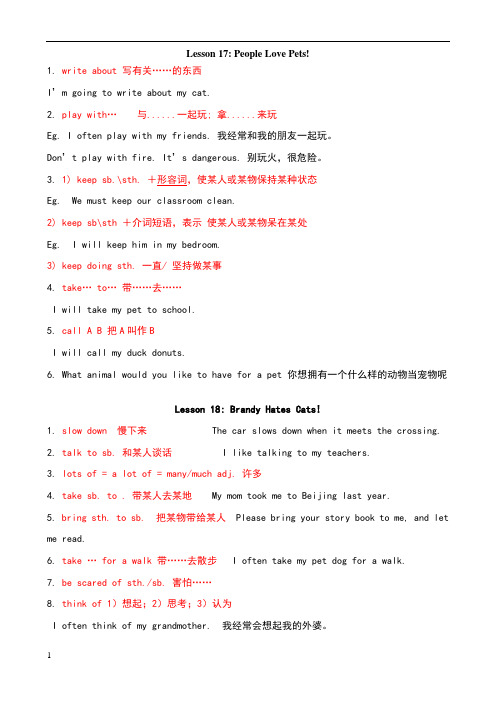Unit 3 Lessons 17--18
- 格式:doc
- 大小:47.50 KB
- 文档页数:3

Unit 3 My father is a writer.Lesson17—18一、教学目标:1、询问他、她是谁?2、描述他人的职业(同义句)二、教学重点:1、在熟练地用英文描述家人的职业。
三、教学难点:1、介绍家人及特点,通过本课学会向他人大方自然,流利地介绍自己的家人及职业。
四、教学准备:录音五、教学过程:1、Revision复习上节课重点句子及单词2、Presentation1)复习有关职业的词,教师可表演该职业的动作,让学生来猜,引导学生进入本课。
例记者reporter警察policeman 女警察policewoman 等2)关于上面的职业,教师可询问学生你是做什么的?what does your uncle/aunt do?引出What’s his /her job?3) listen to the tape and answer the questions.听课文录音回答问题T: Who’s he?What’s his job?Is his aunt a policewoman?S:He is my uncle.He is a policeman.Yes, she is a policewoman.听力原文:Gao Wei: Hi, Kate! Look at today’s newspaper.(嗨,凯特!看今天的报纸。
)Kate: Wow! A policeman. (哇!一位警察!)Gao Wei: Who is he? Can you guess?(他是谁?你们能猜一猜吗?)Peter: Sorry, I don’t know.(对不起,我不知道。
)Gao Wei: He’s my uncle.(他是我叔叔)Kate: Really? He looks great in his uniform.(真的吗?他穿他的制服看起来很棒。
)Gao Wei: Yes. He often helps people in his work.(是的。


Lesson17:Staying Safe in an Earthquake教学设计一、教材依据:本课是冀教版九年级第三单元第五课,有关安全这一话题。
二、教材分析:本课内容为有关地震的话题,作为第三单元“安全”其中的一部分,是以如何在地震中自救为话题而展开的。
它主要讲了当地震来临时,我们处在室内户外及地震后的正确做法,增强中学生自救能力。
指导学生掌握和熟练运用那些难以理解的词、句型和句子,如calm, system, survival stay calm ,protect…from doing, pull over keep an eye for等。
指导学生口头熟练复述地震自救措施。
三、学情分析:初中的学生,活泼好动,在上放学时都应该注意相关安全,保证自己的健康。
同时他们在情感态度、学习策略和文化意识方面都存在诸多进一步解决的问题。
例如:许多学生不明确学习英语的目的;有些同学对学好英语缺乏自信,不敢用英语表达,缺乏小组合作意识。
针对这些情况,课前以视频吸引学生的注意力;课堂上通过图片、竞赛来学习单词、句型,设置情景,进行地震中自救的表达练习,从而提高学生学习英语的兴趣。
通过多鼓励,分层式教学,根据不同学生的程度,设计不同的问题,帮助孩子们树立自信心。
四、设计思路:指导思想:激发和培养学生学习英语的兴趣,使学生树立自信心,养成良好的学习惯和形成有效的学习方法,发挥自主学习的能力和合作精神,使学生掌握一定的语言综合运用能力,倡导体验、实践、参与、合作与交流的学习方式和任务型的教学途径,培养学生跨文化交际意识。
对本课我主要采取了如下几种教法:1.重点解释,个别操练。
在每一堂教学中,学生总会遇到一些难以理解的词、句型、短语、句子或某一语法现象。
如本课出现的形容词比较级的用法等都需要教师个别解释甚至创设语言情境进行操练和举例,以扫除自由交际过程中的“拦路虎”,为语言的进一步学习奠定基础。
2.指导学生展开情景对话。


Lesson 18 Never Catch a Dinosaur教学设计一、教材分析本节课是本单元的最后一课,是总结性的一课,通过听、说、读、写来培养学生综合运用知识的能力,通过有限的课堂实践活动,能准确地用英语在交际中运用本单元的话题对自己与他人进行描述,作出比较并进行判断。
本课没有新的知识点,是对前面课的复习与总结,在情感上有一个升华。
二、教学目标分析:1. 知识目标:(1)语言知识:掌握本课时的词汇及比较级用法(2)语言技能:学会描述安全(3)情感目标:让学生知道安全的重要性,学会如何远离危险(4)能力目标:提高学生听、说、读、写及知识自学的综合能力2.教学重点:掌握词汇及比较级用法3.教学难点: 能用英语描述安全4.教具: audiotape, pictures,多媒体三、学情分析我们教学的对象是九年级学生(以中等生为主),他们学习英语有较强的记忆力和模仿能力,有待培养知识的扩展运用能力。
因此在教学活动中尽量让他们参与到活动中来,有更多的机会来说英语,减少他们的恐惧感。
四、教学策略1、兴趣活动策略:采用图片、合作等多种活动方式展开课堂教学2、采用“任务型”教学方法;情景教学法和交际教学法五、教法设计:开展多种类型的任务型活动,提供给学生合作交流的空间和时间,促使学生为完成任务和同学进行合作,由浅入深,由易到难,循序渐进地深化教学内容。
展开以教师为主导,以学生为主体的师生双边活动。
六、教学手段:主要以现代化电教手段--多媒体辅助教学,贯穿整个教学过程。
增加了直观性和趣味性,加大了课堂密度,提高了教学效果。
七、教学程序:Step1. Lead inReview: Do you still remember Danny’s accident?Choose some students to retell Danny’s accident.So, Brain has a rule: never catch a falling dinosaur.Look at the picture. What are the two boys d oing?Is it safe to climb the tree? Why?Today, l et’s learn Li Ming’s accident which happened when he was climbing the tree.Lead in the text by discussingStep2. Vocabulary.Before the new lesson, make the students know well about the new vocabulary with the help of the pictures and d efinitions. Step3. Listening task:Listen to the 1st and 2nd paragraphs of the letter and tell true (T) or false (F).① Danny felt terribl e because of his carelessness. ( )②It was lucky for Brian to catch a falling dinosaur. ( )Step4. Reading task:Read rest of the letter and d o the foll owing tasks.① He climbed _______ and ________. He thought he ________ the sky.② Why did Li Ming fall?③ How long did it take Li Ming to recover?④Li Ming coul dn’t _________ ping- pong training that year.⑤Now, I always listen to my mother’s warnings about safety.Then check the answers.Step5. retellingSince the Ss have understood the main information of the lesson, l et them use the key words and phrases retell Li Ming’s accident.Step6.DiscussionDiscuss : What other safety rules for teenagers can you think of?First, l et the students discuss in teams.Then, choose some students to present their ideas.Step7. PracticeHere are some safety rules for teenagers. Read them and fill in the blanks with the words in the box.1. Tony didn’t ___________ our warning and he fell again.2. Danny met an ol d friend of his and _________ him at once.3. Li Hong _________ her parents and gave them a call at once.4. I have _________ her many time, but I’ve never heard from her at all.5. Tony ____________ and found some littl e birds in it.( Answers:1. listen to 2. said hello to 3. thought of4. written to5. climbed the tree)Step8.Production Progress①Give the ss some extended paragraphs to read and elicit the activity.② Your school will have a new chemistry lab. Work together and design 10 safety rules for the new lab. (poster)Give the students some time to get ready and then choose one or two teams to show their posters.Step9. Summary:Step10.Homework八.板书设计:Lesson 18 Never Catch a DinosaurKey words: rule branch trainingSentences: 1. I will never try to catch a falling dinosaur.2.She watched me climb higher and higher.3.There was something wrong with my leg.4.I always listen to my mother’s warning about safety.九.教学反思:一、树立信心,明确目标信心是动力,目标是方向。

Lesson 17: People Love Pets!1. write about 写有关……的东西I’m going to write about my cat.2.play with… 与......一起玩; 拿......来玩Eg. I often play with my friends. 我经常和我的朋友一起玩。
Don’t play with fire. It’s dangerous.别玩火,很危险。
3. 1) keep sb.\sth. +形容词,使某人或某物保持某种状态Eg. We must keep our classroom clean.2) keep sb\sth +介词短语,表示使某人或某物呆在某处Eg. I will keep him in my bedroom.3) keep doing sth. 一直/ 坚持做某事4. take… to…带……去……I will take my pet to school.5. call A B 把A叫作BI will call my duck donuts.6. What animal would you like to have for a pet 你想拥有一个什么样的动物当宠物呢Lesson 18: Brandy Hates Cats!1. slow down 慢下来 The car slows down when it meets the crossing.2. talk to sb. 和某人谈话 I like talking to my teachers.3. lots of = a lot of = many/much adj. 许多4. take sb. to . 带某人去某地My mom took me to Beijing last year.5. bring sth. to sb. 把某物带给某人 Please bring your story book to me, and let me read.6. take … for a walk 带……去散步I often take my pet dog for a walk.7. be scared of sth./sb. 害怕……8. think of 1)想起;2)思考;3)认为I often think of my grandmother. 我经常会想起我的外婆。
教学设计Unit 3 Lesson 17: Save the Tigers【教材分析】本课属于冀教版《英语》八年级下册Unit 3 Animals Are Our Friends中的第5课,主要围绕animals这一主题展开各种教学活动。
本单元旨在创设一个愉快的交流环境和通过听,说,读,写来培养学生综合运用这些知识的能力,再通过有限的课堂实践活动,让学生用英语表达关于动物的情况。
本课是这个单元的第五课时,分别通过描述救助老虎的一个组织和老虎对于环境的重要性以及老虎面临灭绝的危险,最终为了号召人们保护老虎保护野生动物。
【学情分析】我所教授的是初二学生(以中等生为主)。
学生对这个主题感兴趣,好奇心强,求知欲旺盛,但是对于英语既感到好奇又是很担忧,很希望得到老师的肯定。
因此,在教学中,我尽量让他们参与到教学中来,用尽可能丰富的课堂活动来为学生创造更多说英语的机会。
通过学生之间的合作学习,降低他们学习的难度,使他们不断体会到成功的喜悦。
一、设计思路1.指导思想:《中小学英语课程标准》指出:英语教学中应体现交际性,要结合学生的年龄特点和生活实际,创设交际情景,通过大量的语言实践,使学生获得综合运用英语和语言技能进行交际,以及写作的能力。
针对初中英语新教材容量大的特点,为了使教学面向全体学生,依据本课的课程理念,采用自主阅读为辅,课堂小组合作讨论为主的学习模式,充分发挥学生学习的主观能动性。
2.教学目标知识目标:使学生掌握关于保护动物的词汇,正确的掌握和使用不定代词。
技能目标:使学生培养语言学习能力,尤其是阅读写作能力。
情感目标:使学生热爱动物,保护动物,爱护环境;。
3.教学重点与难点教学重点:(1)掌握一些与互保护动物有关的词汇。
(2)提高学生的阅读和口语能力。
教学难点:帮助学生理解如何跳读、略读、细读课文。
并把所学应用到日常交流中。
三、教学过程Step 1: Lead in.Lead in with a picture: food chain→The tiger is at the top of the food chain.Q: Does the tiger have enemies?Show some pictures about tigers in danger.Q: Who is the tiger's biggest enemy?→Human beingsQ: What should we do?→Save the Tigers设计意图:层层递进带领学生进入本课主题,通过提出问题的方式引发学生思考,自然过渡引出文章标题。
Unit 3 Lesson 17教学目标1. To learn some useful words and expressions in this lesson2. To understand the passage about earthquake3. To learn to give warnings with imperatives核心素养实践创新1.劳动意识:掌握有关地震中自我保护的英语表达;2.技术运用:能用英语描述地震来临时的正确做法。
教学重点本节课重点单词、短语、句型。
教学难点能用英语描述地震来临时的正确做法。
教学过程一、导入新课Have you ever heard of an earthquake? When and where?n. ['ɜ:θkweɪk] 地震Wenchuan EarthquakeEarthquakes are terrible and they usually e without warning.earthquake /'ɜ:θkweɪk/ n. 地震stay clam保持镇静 /kɑ:m/ adj. 镇静keep an eye out for密切关注;提防;警觉protect...from falling objects使……免于落物的伤害protect...from object使……免于 /'ɒbdʒɪkt/ n.物体pull over (把车)开到路边bring down the water system使供水系统瘫痪bring down system使瘫痪 /'sɪstəm/ n.系统survival /sə'vaɪvl/ n. 生存;存活;幸存New words and expressionsearthquake n. 地震clam adj. 镇静的;沉着的object n.物体;对象;目标system n.系统survival n. 生存;存活;幸存stay clam 保持镇静protect...from (doing) ...使……免于……; 防止……遭受……pull over 把车)开到路边keep an eye out for 密切关注;提防;警觉bring down 使瘫痪;降低;减少二、新课讲解Language points1. Stay calm as the earth begins to shake and move.当大地开始摇晃和移动时要保持镇静。
Lesson 17Presents from Canada!Ⅰ.根据句意及所给提示,写出单词的正确形式1.I haven't finished my homework y .2.Jim wants to write and p his friend a letter.3.—What's Mr. Green's (地址)?—132 Bank Road.4.My father has coll ected many (邮票) for me these days. 5.Can I use your (胶带) to put them together?Ⅱ.用方框中所给单词的适当形式填空thirteen, present, wish, top, send 6.John, pl ease give my best to your parents.7.He was the person to buy salt in the shop.8.Lynn's friend her an e-mail once a month.9.There is a big appl e tree on the of the hill.10.Mother's Day is coming. I will buy a special for my mother. Ⅲ.单项选择()11.—Have you watched the movie?—Not . I am very busy these days.A.yet B.stillC.just D.ever()12.Best to you on your el eventh birthday.A.wishes B.hopes C.plans D.subjects()13.—Mum, !Let's go.—OK, d ear.A.here you are B.good luck C.all ready D.well d one()14.—Lucy, why are you so sad?—I have looked for my cat everywhere, but I .A.have a conversationB.have no luckC.have a restD.have a discussion()15. the top of the trees, there are lots of col ourful stars.A.In B.OnC.Of D.AboutⅣ.完形填空Like most Chinese, Mr. Zhang has a traditional family. 16 he and his wife are mid dl e school teachers whil e their 6-year-old son is a pupil. Mr. Zhang's mother lives with them and helps them 17 the kid. They l ove one another and live a happy life.Yesterday it was Mr. Zhang's mother's birthday. The coupl e wanted to d o 18 to show their l ove for her. After a big dinner, Mr. Zhang brought a basin(盆) of warm water and asked his mother to sit 19 the basin. He took off her shoes and put her 20 into the water. After that he began to wash them 21 . His wife helped to comb his mother's hair sl owly. Seeing this, the boy 22 his mother's exampl e. He tried to comb his mother's hair, too. But he was not 23 enough to d o that. So he brought a chair and stood on it. Everyone could feel the warmth and l ove in the family.As we all know, it is a good Chinese tradition to respect the ol d and take care of the young. We should try our 24 to care for our family. We must visit our parents as often as possibl e and have a 25 with them on the phone even though we may work far away. Ind eed, family is a place of happiness.()16.A.Both B.EitherC.Neither D.Each()17.A.look for B.l ook outC.l ook after D.l ook at()18.A.nothing B.somethingC.everything D.anything ()19.A.in B.on C.und er D.in front of ()20.A.foot B.feet C.hand D.hands ()21.A.carefully B.l oudly C.sadly D.angrily ()22.A.advised B.suggested C.mad e D.foll owed ()23.A.old B.tall C.short D.young ()24.A.good B.many C.best D.most ()25.A.chat(聊天) B.sl eep C.meal D.restⅤ.阅读理解()26.Silvia is from and she will be years old. A.Spain; 21 B.France; 30 C.Japan; 21 D.France; 60 ()27.If you are in Spain and today is your twelfth birthday, .A.you can get twelve presentsB.your friends may pull your ear twelve timesC.your twelve friends will come to your partyD.you can get up at twelve()28.In Japan, is the beginning of a new life.A.the first birthdayB.the twentieth birthdayC.the sixtieth birthdayD.the thirtieth birthday()29.Which of the foll owing is TRUE according to the passage? A.In Japan, peopl e often get something red on the sixtieth birthday. B.In France, the thirtieth birthday is the beginning of a new life. C.Gerard won't invite his friends to his birthday party.D.Mrs. Sai is from Spain.()30.In France, when your birthday comes, .A.your friends should invite you to go out for dinnerB.you shoul d give presents to your friendsC.your friends shoul d hol d a party for youD.you shoul d invite your friends to go out for dinnerLesson 18Li Ming's BirthdayⅠ.根据句意及所给提示,写出单词的正确形式1. My uncl e is a p . He works in a post office.2. In my city, the wind b the trees strongly in spring.3.There is a birthday cake with nine (蜡烛) on the d esk.4.That is a (深的) river. You'd better not swim in it.5.There are a l ot of (气球) of different colours in the room.Ⅱ.用方框中所给单词的适当形式填空fashion, breathe, eat, hol d, bring6.l ong noodl es means you will live a long life.7.Gina's parents a party for her birthday yesterday evening.8.The little girl's nose is covered with something. She can't very well. 9.Mary some beautiful fl owers to the party yesterday.10.The styl e of the dress is in this year. Miss Liu likes the dress very much. Ⅲ.单项选择()11.—Is this dress fashion?—No, it's fashion. The styl e is new.A.in; in B.out of; out ofC.in; out of D.out of; in()12.If you feel nervous, you can a deep breath.A.make B.l etC.act D.take()13.My mother bought a birthday cake with candl es yesterday, because it was my birthday.A.thirteen; thirteenB.thirteenth; thirteenthC.thirteen; thirteenthD.thirteenth; thirteen()14.I lit the candl es and later.A.bl ew out them B.bl ew it outC.bl ew them out D.bl ew out it()15.[2020·深圳]—Sam, coul d you tell me something about Earth Hour? —Sure. Peopl e usually lights and keep them off for an hour.A.turn off B.turn onC.turn up D.turn d ownⅣ.[2020·遵义改编]词语运用阅读下面短文,在空白处填入一个适当的单词或括号内单词的正确形式。
Unit 3 Would you like to come to my birthday party?Lesson 17学情分析:本课前面4课学习的话题时如何表达日期,生日,怎样准备生日聚会。
学生学习第十七课的目的是为了继续话题是——生日聚会的全过程。
本课系统学习了过生日的几个步骤,要求学生掌握这些内容的英文表达方式。
并能对所学进行简单的运用,培养了学生对语言的应用能力。
三维目标:一、知识与技能(一)知识目标1.能够听、说、认读以下单词和词组:Light the candles.Make a wish now.sing the birthday song,blow out the candles,a piece of paper,cut the cake.2)能够听、说、认读以下句子结构: I have a new storybook for you.Here are some chocolates for you.3. 能够运用本单元的语言知识进行扩展性的情景会话。
(二)能力目标1. 能够在真实的语境中使用语言知识询问及表达自己的学习方法和学习习惯。
2. 能够将所学知识运用到实际生活当中。
(三)教学重难点1. 掌握本课的单词词组如:I have a new storybook for you.Here are some chocolates for you. ect.,并能替换运用;2. 运用文中的语言材料编演新对话。
二、过程与方法(一)教法:本课中我主要采用直观情景教学法,通过幻灯片及实物给学生创设真实的情景,让学生充分地练说。
采用启发式教学教学模式,让学生阐述及陈述自己的学习方式。
并充分利用各种方法有效地辅助教学,帮助学生总结对比,以达到更好的学习效果。
(二)学法:本节课,我充分利用实物、幻灯片等方式,创设接近现实的生活情境,提供语言交际的场所,唤起学生思维的积极活动,诱发他们学习英语的潜在能力。
Unit 3 Lessons 17~18
(20分钟50分)
Ⅰ. 用所给词的适当形式填空(3分钟,5分)
1. Have fun _____ (learn)English, children.
2. Thanks for _____ (carry)the heavy box for me.
3. I like watching TV and so _____ (do)my brother.
4. There is a street _____(call)Zhongshan in Jinan.
5. I like going to the National Day _____(celebrate).
Ⅱ. 单项选择(3分钟,5分)
1. —Have fun on your birthday, Li Ming!
—_____.
A. That’s all right
B. That’s OK
C. You are welcome
D. Thank you
2. My sister is ready _____ her exam.
A. for
B. with
C. in
D. to
3. His factory is 50 miles _____ his house.
A. far away from
B. far
C. away from
D. far away
4. Would you like a glass of milk _____ breakfast?
A. about
B. for
C. to
D. with
5. —I wondered _____.
—Because he had to look after his grandma in the hospital.
A. why didn’t Tim come to my birthday party
B. why Tim didn’t come to my birthday party
C. why doesn’t Tim come to my birthday party
D. why Tim doesn’t come to my birthd ay party
Ⅲ. 完成句子(3分钟,10分)
1. 中国的春天常在三月下旬来到。
Spring usually comes in _____ _____ in China.
2. 她没有必要呆在家里。
She _____ _____ _____ stay at home.
3. 离儿童节还有一周的时间。
_____ a week _____ Children’s Day.
4. 我非常想念你。
I _____ you _____ _____.
5. 明年我就十三岁了。
I _____ _____thirteen years old next year.
Ⅳ. 句型转换(3分钟,10分)
1. Thanksgiving comes in early October. (用late November改为选择疑问句)_____ Thanksgiving _____ in early October _____ _____ _____?
2. Dad bought me a new backpack. (改为同义句)
Dad _____ a new backpack _____ _____ .
3. It’s three days before Thanksgiving. (改为同义句)
Thanksgiving _____ _____ _____ three days.
4. Tony had to look after his grandma. (改为一般疑问句)
_____ Tony _____ to look after his grandma?
5. He will be away from Beijing for eight weeks. (对划线部分提问)
_____ _____ _____ he be away from Beijing?
Ⅴ. 补全对话,每空一词(4分钟,10分)
Lily: Good afternoon, Han Mei! I’m glad you can come for our 1 dinner.
Han Mei: Thanks for 2 me. Why do you call it dinner when we are eating 3 noon? Lucy: Because it’s a big meal. We c all it dinner when we have a lot to eat.
Han Mei: Is that a chicken? It’s so big.
Lily: No. It’s a 4 . It’s much 5 than chicken.
Han Mei: Why do Americans and Canadians 6 Thanksgiving?
Lily: It’s just like your Mid Autumn Festival in China. F amilies get 7 and celebrate the bright, round moon. In America and Canada, families get together to celebrate the harvest.
Han Mei: So we each have an autumn 8 .
Lucy: Yes, and both of us celebrate it 9 our families. Some things are the 10 in China, Americ a and Canada.
Ⅵ. 阅读理解(4分钟,10分)
We call the Chinese New Year the
Spring Festival. There is a name for
each Chinese year. We may call it
the year of the sheep, the year of the
monkey or the year of the pig. And this year is the year of the tiger.
Before New Year’s Day, people are busy shopping and cleaning their houses. On New Year’s Eve, there is a big family dinner. After dinner, all the family stay up late to welcome the New Year. On the first day of the New Year, people put on their new clothes and go to visit their friends. They say “Good luck”and some other greetings to each other. People usually have a very good time during the festival.
1. How many Chinese festivals are about in this passage?
A. One.
B. Two.
C. Three.
D. Four.
2. We can find every Chinese year is given _____ name.
A. an animal
B. a plant
C. a family
D. a full
3. How do Chinese people usually spend New Year’s Eve?
A. They put on new clothes and go to the park.
B. They visit their friends and talk about the New Year.
C. They are busy shopping and cleaning their houses.
D. They have a big dinner and stay up late to welcome the New Year.
4. On New Year’s Day, people say “_____” to each other when they meet.
A. Merry Christmas
B. Good luck
C. Happy New Year
D. Both B and C
5. The best title for this passage is ______ .
A. Good Time
B. The Spring Festival
C. Big Dinner
D. The Year of the Tiger。